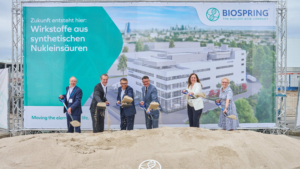
Ethris GmbH bags US$5m from CEPI
Oslo-based Coalition for Epidemic Preparedness Innovations (CEPI) has granted US$5m to RNA formulation specialis Ethris to support studies that demonstrate spray-dried RNA vaccines remain stable at room temperature and are suitable for mucosal delivery.
Norway’s Coalition for Epidemic Preparedness Innovations (CEPI) supports German RNA drug developer Ethris GmbH with US$5m to prove that its spray-dry delivery technique enables nasal delivery of mRNA vaccines that are stable at room temperature.
Ethris has created a new path from genes to therapeutic proteins using chemically modified, non-immunogenic messenger RNA (SNIM mRNA) and lipidoid nanoparticle (SNaP LNP) technology platforms to discover, design and develop RNA therapies and vaccines. The technology is designed to deliver highly potent mRNA-based drug products directly to the upper and lower respiratory tract.
Spray-drying—the process of rapidly drying liquid with hot gas—is a widely used technique in asthma treatments such as dry powder inhalers and is a proven method for creating stable powders for respiratory delivery. Applying this approach to RNA vaccines could address major challenges, including the dependence on ultra-low-temperature storage and complex delivery systems. While RNA-based vaccines played a pivotal role in fighting COVID-19, their cold-chain requirements limited equitable access in low-resource settings. A spray-dried RNA vaccine could provide room-temperature stability and simplify distribution. Further, the nasal administration could help to achieve mucosal immunity which scientists believe is key for reducing virus transmission.
The CEPI-funded project will focus on two key objectives:
Firstly, developing a spray-dried mucosal RNA vaccine platform that is stable at room temperature and capable of generating a localized immune response;
Second, establishing an automated RNA manufacturing process that simplifies production, reduces costs, and supports rapid, scalable vaccine development.
Spray-dried vaccines eliminate the need for cold-chain logistics, facilitating distribution to regions lacking the necessary infrastructure. Furthermore, automated manufacturing processes will shorten production timelines, enabling faster responses to outbreaks and reducing costs to ensure affordability.
If successful, the technology will be advanced in accordance with Good Manufacturing Practice (GMP) standards—guidelines that ensure vaccines are made safely, consistently, and with high quality—and tested with a specific RNA-based vaccine candidate, initially targeting influenza as a proof-of-concept, if proven effective.
CEPI and Ethris are committed to enabling equitable access to the outputs of this CEPI-supported programme, in line with CEPI’s Equitable Access Policy. This ultimately includes a commitment to vaccines being available first to populations at risk when and where they are needed at an affordable price should a related vaccine be developed further using CEPI funding. Project results, including data generated as part of this project, will be published open access for the benefit of the global scientific community.
Ethris could benefit from its collaborations like this in providing proof-of-concept for its proprietary pipeline, ETH-47, a Phase I RNA formulation targeting interferon gamma to suppress virally induced asthma attacks and ETH42, a RNA drug targeting CCDC40 to produce ciliary proteins in the respiratory lacking in patients with the rare disease primary ciliary dyskinesia.


 Bayer AG
Bayer AG Adobe stock photos - Alernon77
Adobe stock photos - Alernon77  BioSpring
BioSpring